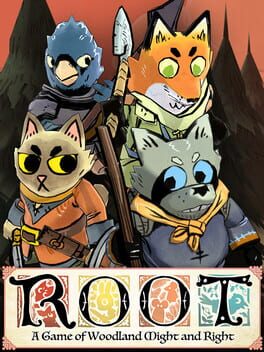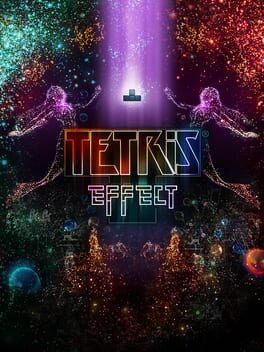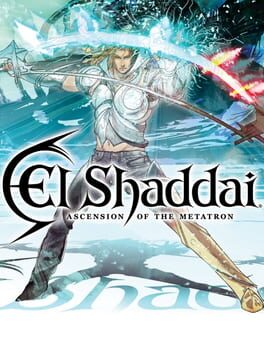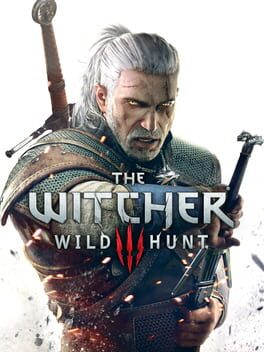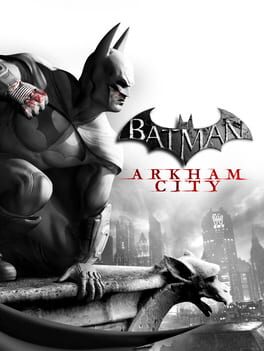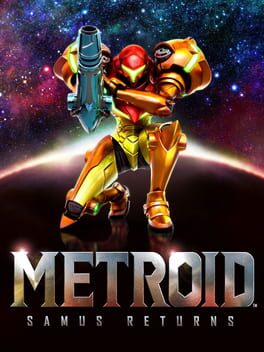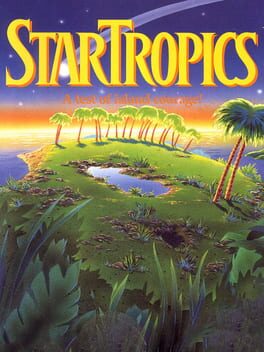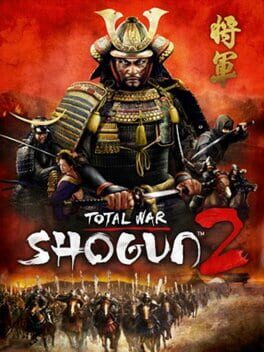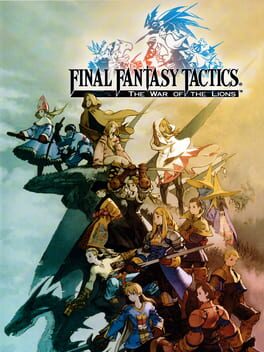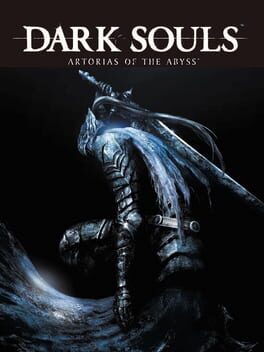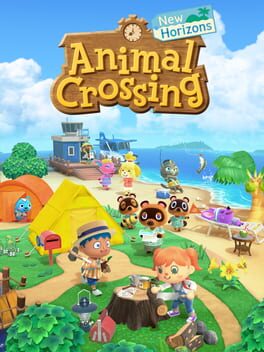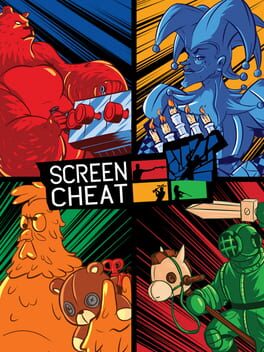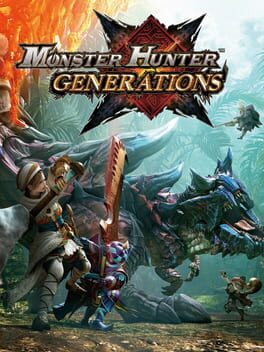synthezoid
2020
2018
El Shaddai: Ascension of the Metatron is a criminally overlooked and underappreciated gem helmed by director Sawaki Takeyasu, previously a character designer and artist for games like Devil May Cry. While its slightly simpler combat mechanics might feel like a step back for fans of the complexity and intensity of that series, El Shaddai toes the line by providing a sense of novelty and wonder with every level and a colorful, ever-changing world of utter unreality befitting its bizarre apocryphal religious theme. Being ordered around by Lucifer himself on a cell phone will feel like the least unusual thing you've been through by the end of its brisk playtime, and for that feeling alone, it's one of the most memorable experiences I've ever had with a game.
This is one of the only single player games I've played to provide more than 100 hours of content (with the expansions) and have every minute of those hours feel justified. Even the side quests feel uniquely planned and cared for, like a labor of love or a second-born child. Choices can have long-term, weighty consequences. Every area in the game feels thought-out and crafted to a degree that some entire games never reach. The Witcher 3 is a rare accomplishment in RPGs, in storytelling, in games--one which occupies our time without wasting it, and one which reminds us that 'breadth' and 'depth' don't have to be antonyms. Bigger isn't always better, but it isn't always worse, either.
2011
While the "makes you feel like Batman" review quip has been done to death, it stuck for a reason. Rocksteady perfected the superhero power fantasy so thoroughly that even Spider-Man is borrowing from it now.
An open but tightly crafted world, memorable characters and performances, and some unforgettable boss fights set this game apart from its already excellent predecessor. That its sequel was an ambitious but imperfect step back only cements what Arkham City got right: just about everything.
An open but tightly crafted world, memorable characters and performances, and some unforgettable boss fights set this game apart from its already excellent predecessor. That its sequel was an ambitious but imperfect step back only cements what Arkham City got right: just about everything.
2017
This game has been talked about to death, hasn’t it? Since its release in 2017, Team Cherry’s ambitious debut has taken the world of indie gaming by storm. We’ve all seen its moody, blue-purple tones and friendly bug-faces gracing our Steam homepages by now. Maybe you’ve already bought the game and wandered its misty hallways for a few hours before dropping it to play Slay the Spire again. It’s okay. I won’t blame you. I did the same at first. Let me tell you why you should give it a closer look.
You’ve probably noticed from countless other reviews by now that Hollow Knight is highly derivative. The names Metroid and Dark Souls will be thrown around a lot. It’s a Metroidvania game (Insectroid?), after all–a game of sprawling, branching corridors locked by sensational and empowering items that serve as de facto keycards for doors you’ve passed and doors you’ve yet to find. Metroidvania games share a common DNA, and Dark Souls takes already takes influence from them, so really it’s just imitating a long line of refined imitations, right? Hollow Knight is just an exemplar of a genre and nothing more?
I wouldn’t say so, illustrative rhetorical question. Hollow Knight does not just distill elements from other games; that would be reductive. Hollow Knight is additive: it takes the formula of a Souls-like-Metroidvania game and then adds to it. It adds all of its interwoven stories and interlocking mechanisms and interconnected levels and interspersed secrets liberally, and uses them to create something distinctly new. The un-restriction of the map and your freedom to explore in so many directions feels bold and unprecedented even for a genre whose primary characteristic is that very freedom because of just how far it takes it. The open-endedness of its levels feels overwhelming in just the right way to inspire curiosity, and sequence-breaking almost loses its meaning given how loose “sequence” already is in the conjoining labyrinths of Hollow Knight. It makes Super Metroid look linear by comparison.
Hollow Knight also learns from its predecessors, carrying both the carefully crafted polish of Metroid and the expansiveness, customizability, and extensive postgame content of Castlevania. It even takes structural cues from Dark Souls, making boss fights engaging challenges that leave you looking forward to the next. (Though only the optional bosses really reach the level of difficulty of a true Souls boss, that’s not a problem–Hollow Knight simply isn’t interested in being Dark Souls, just in learning from its successes. You can see more of this influence in its worldbuilding.) It oozes atmosphere all its own, despite evoking feelings similar to the lonely dread of Metroid, the bleak mystery of Dark Souls, and the Gothic spookiness of Castlevania in equal measure.
The game does not just timidly rehash the decisions of more talented designers; it confidently re-asserts every decision it makes. It’s liable to remind you why you loved those classics by showing you a new experience which rivals the quality of those that inspired it. Hollow Knight‘s design is not a success of repetition, but, much like its gameplay, a success of exploration, finding new opportunities in well-trodden places.
You’ve probably noticed from countless other reviews by now that Hollow Knight is highly derivative. The names Metroid and Dark Souls will be thrown around a lot. It’s a Metroidvania game (Insectroid?), after all–a game of sprawling, branching corridors locked by sensational and empowering items that serve as de facto keycards for doors you’ve passed and doors you’ve yet to find. Metroidvania games share a common DNA, and Dark Souls takes already takes influence from them, so really it’s just imitating a long line of refined imitations, right? Hollow Knight is just an exemplar of a genre and nothing more?
I wouldn’t say so, illustrative rhetorical question. Hollow Knight does not just distill elements from other games; that would be reductive. Hollow Knight is additive: it takes the formula of a Souls-like-Metroidvania game and then adds to it. It adds all of its interwoven stories and interlocking mechanisms and interconnected levels and interspersed secrets liberally, and uses them to create something distinctly new. The un-restriction of the map and your freedom to explore in so many directions feels bold and unprecedented even for a genre whose primary characteristic is that very freedom because of just how far it takes it. The open-endedness of its levels feels overwhelming in just the right way to inspire curiosity, and sequence-breaking almost loses its meaning given how loose “sequence” already is in the conjoining labyrinths of Hollow Knight. It makes Super Metroid look linear by comparison.
Hollow Knight also learns from its predecessors, carrying both the carefully crafted polish of Metroid and the expansiveness, customizability, and extensive postgame content of Castlevania. It even takes structural cues from Dark Souls, making boss fights engaging challenges that leave you looking forward to the next. (Though only the optional bosses really reach the level of difficulty of a true Souls boss, that’s not a problem–Hollow Knight simply isn’t interested in being Dark Souls, just in learning from its successes. You can see more of this influence in its worldbuilding.) It oozes atmosphere all its own, despite evoking feelings similar to the lonely dread of Metroid, the bleak mystery of Dark Souls, and the Gothic spookiness of Castlevania in equal measure.
The game does not just timidly rehash the decisions of more talented designers; it confidently re-asserts every decision it makes. It’s liable to remind you why you loved those classics by showing you a new experience which rivals the quality of those that inspired it. Hollow Knight‘s design is not a success of repetition, but, much like its gameplay, a success of exploration, finding new opportunities in well-trodden places.
Samus Returns is a game that should have been let down by repeated bosses and a slightly more linear world design with fewer truly hidden secrets, but which so thoroughly nails the core gameplay that I found myself obsessively plowing through it to completion over the span of a week or so. Is it objectively flawed? Sure. Is it a striking and absorbing return to form for a long-dormant series? Hell yes.
1990
2011
I made it through a few story battles, but I hit a roadblock. I figured, hey, I haven't been trying to optimize my party much, so maybe I just need a bit more gear, some small stat increases. So I went back and shopped for some goods and fought some random encounters along the way, outfitting my party better than they were the first time. And then I replayed the battle. I lost, lost again, lost again. Something was wrong. I Googled it.
"Oh," the forums said, "you should be level 5 for that battle. Go grind." My units were all about level 2.
This game takes upwards of 40 or 50 hours to beat for most players. (https://howlongtobeat.com/game?id=3514) While I found the faux-Shakespearean dialogue immensely charming, I have yet to be convinced that I should spend another 40+ hours in this game if a third of those hours are just going to be replaying content I've already beaten. I wanted to like this game, but who has that much time to waste?
"Oh," the forums said, "you should be level 5 for that battle. Go grind." My units were all about level 2.
This game takes upwards of 40 or 50 hours to beat for most players. (https://howlongtobeat.com/game?id=3514) While I found the faux-Shakespearean dialogue immensely charming, I have yet to be convinced that I should spend another 40+ hours in this game if a third of those hours are just going to be replaying content I've already beaten. I wanted to like this game, but who has that much time to waste?
2020
I've been simping for Supergiant for the better part of ten years--ever since Bastion. Here's to the recognition they deserve. While Bastion and Transistor are fun (I haven't gotten to play Pyre yet), it does feel like their short playtimes are a necessity compensate for the limited depth of their gameplay. Hades can keep you playing much longer, and it absolutely earns that. Where their previous games excelled in vibes and storytelling, Hades does too--it's just even more replayable and addicting than most games out there manage.
I'm normally a bit of a snob about roguelites. Too much metaprogression feels bad to me; I like the notion that with enough skill, I could beat the game on my first run. I never will, but the sensation of fairness is what matters. Most of my favorite roguelites, like FTL, Monster Train, Slay the Spire, and Into the Breach, only offer unlockable new options rather than powers; the game never gets substantially easier until you get substantially better (or luckier). When games like Rogue Legacy let you become more powerful with each successive run, it can start to feel like the game is designed around grinding to overcome challenges rather than developing skill and familiarity. Hades does exactly this, but it sets itself apart by considering how this altered gameplay loop should necessarily impact every other part of the game. The writing, themes, and the game's entire artistic vision hinge on this progression, and it makes the whole gameplay loop feel justified. A halfway-finished run can still advance the narrative in one way or another, while a finished run doesn't have to close the door on your motivation to keep playing thanks to all the additional content and options at your disposal. Hades is so brimming with polish, it makes it look effortless to make a game this good. It's only after you go back to play some of the games it resembles that its real level of quality is drawn into sharp focus.
I'm normally a bit of a snob about roguelites. Too much metaprogression feels bad to me; I like the notion that with enough skill, I could beat the game on my first run. I never will, but the sensation of fairness is what matters. Most of my favorite roguelites, like FTL, Monster Train, Slay the Spire, and Into the Breach, only offer unlockable new options rather than powers; the game never gets substantially easier until you get substantially better (or luckier). When games like Rogue Legacy let you become more powerful with each successive run, it can start to feel like the game is designed around grinding to overcome challenges rather than developing skill and familiarity. Hades does exactly this, but it sets itself apart by considering how this altered gameplay loop should necessarily impact every other part of the game. The writing, themes, and the game's entire artistic vision hinge on this progression, and it makes the whole gameplay loop feel justified. A halfway-finished run can still advance the narrative in one way or another, while a finished run doesn't have to close the door on your motivation to keep playing thanks to all the additional content and options at your disposal. Hades is so brimming with polish, it makes it look effortless to make a game this good. It's only after you go back to play some of the games it resembles that its real level of quality is drawn into sharp focus.
2014
This one is supposed to have less endgame content than 4U, but who actually plays these things long enough to get there? I had a fine time hunting dinosaurs until I got tired. Isn't that all you need from a Monster Hunter game? 3U was my first foray into the series before the slow pace, general clunk, and gathering quests turned me off of it. This one had slightly better quality of life features, online play, and a couple of fun new weapons to try. This adds up to make it a better experience overall, even if I don't ever expect to become a Monster Hunter diehard.
